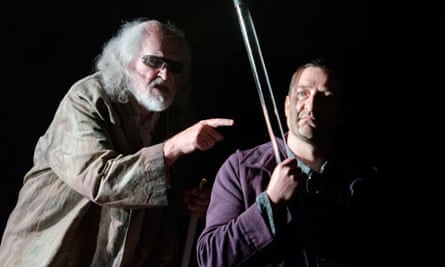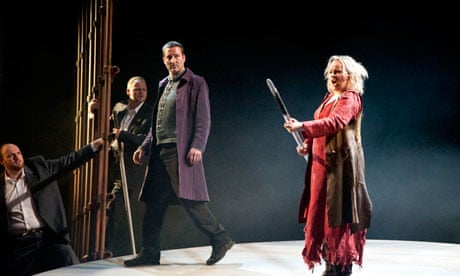Even in an era in which performances of Wagner's Ring come around more frequently than they once did - with the first Proms cycle soon in the offing - a fully staged Ring still remains a visionary's undertaking. A Ring cycle will always be the pinnacle of even an established opera house's aspirations. Transpose all the necessary planning and the sheer cost of mounting the Ring to a small 500-seat theatre in an enthusiast's back garden in the Cotswolds and you have the makings of a folly to match Valhalla itself. Or as Martin and Lizzie Graham's Longborough Festival has proved over the past week, the makings of a genuinely historic achievement in British Wagner production, the most significant since the English-language Ring under Reginald Goodall at the London Coliseum 40 years ago.
The Longborough Ring has been building steadily towards this Wagner bicentenary year cycle since 2007, when the Grahams first staged Das Rheingold. Over the past three summers, Die Walküre, Siegfried and Götterdämmerung have each been unveiled and critically admired, centrepieces of a festival that aims to have Wagner at its core. And now, finally, the fully staged cycle, to be performed three times this summer in Longborough's purpose-built theatre, with mainly young, British soloists, a specially recruited festival orchestra, a serious staging and a host of other helpers.
The first thing that needs to be said, therefore, is that Longborough has proved that the Ring can be done this way after all. History has been against such efforts. Others, not least Glyndebourne's founder John Christie, fantasised about creating a British Bayreuth but failed. The Grahams have actually done it, in a recession and without a reservoir of public money. And they have proved that Wagner, like most opera, does not have to be gargantuan to succeed. Longborough is proof not merely that Wagner's most complex works can be done more intimately but that there are real gains - above all in immediacy - in a carefully calibrated approach of this kind.
Two other people also stand out for their key contributions to this acheivement. Anthony Negus's conducting is the living heart of the whole Longborough Ring. Like Goodall long ago - with whom he once worked - Negus has been a neglected asset in the British musical world. Longborough has been the making of him, above all for the pacing and fluency of his conducting, which brings to mind the grace of Clemens Krauss's Ring rather than the grandeur of Goodall's.
The other is Longborough's own discovery. Rachel Nicholls can occasionally be shrill as Brünnhilde and one desperately hopes she will last the course of the Wagnerian vocal career that will assuredly now open up for her. That said, she is also the most impressive new British Brünnhilde for years and the unquestioned star of the Longborough show. The brightness and power of her upper register is extraordinarily consistent, she sings with fearless conviction, and she is a genuinely believable Brünnhilde, from the exuberant romping with Jason Howard's Wotan - here on top form after a disapppointing Rheingold - in act two of Walküre, to the moral grandeur of her immolation at the end of Götterdämmerung. The fact that she has never sung either the Walküre or Siegfried Brünnhilde before only adds to the excitement of her success.

But it also needs to be said, just as emphatically, that the Longborough Ring is not beyond criticism. It does no service to the indisputably inspiring achievements of Longborough in staging this cycle to pretend otherwise. Alan Privett's staging, in Kjell Torriset's designs, is a skilful adaptation to the constraints of the theatre which consistently facilitates the narrative pulse of the drama. Its resourcefulness is constantly admirable. But in the end this Ring relies on the singers and the orchestra for climactic moments: memorable theatrical images are few and far between. One is on the production's side throughout, but it falls short not just of modern director's opera - no bad thing some will say - but of Wagner's own insistence on strikingly innovative staging as an integral part of the total art work to which he aspired.
A similarly nuanced point needs to be asserted among the many richly deserved plaudits for the Longborough Ring's musical achievements. Part of this is down to the fact that, unlike Nicholls's Brünnhilde, the inhabitants of important roles - Wotan, Siegfried and Alberich all among them - change from opera to opera. Some are more compelling than others, and inevitably this leads to discontinuities of vocal and theatrical characterisation. Likewise, while the orchestral playing is unquestionably one of the most sustained successes of the cycle, it is by no means without blemishes. In Rheingold, in particular, the ensemble had ragged patches, and the 70-strong orchestra sometimes lacked the authentic weight of Wagnerian sound texture that makes Goodall's performances still live in the memory so many years later.
No one who was there, though, would doubt this was a great event. But what now? The question is whether this Ring is a one-off. A new Tristan und Isolde beckons in 2015 under Negus, with Peter Wedd (recently heard as Lohengrin for Welsh national Opera) and Nicholls in the title roles. But the lasting test of Longborough is whether it can build on this remarkable cycle and become a focus of Wagnerian excellence for a generation to come.

Comments (…)
Sign in or create your Guardian account to join the discussion